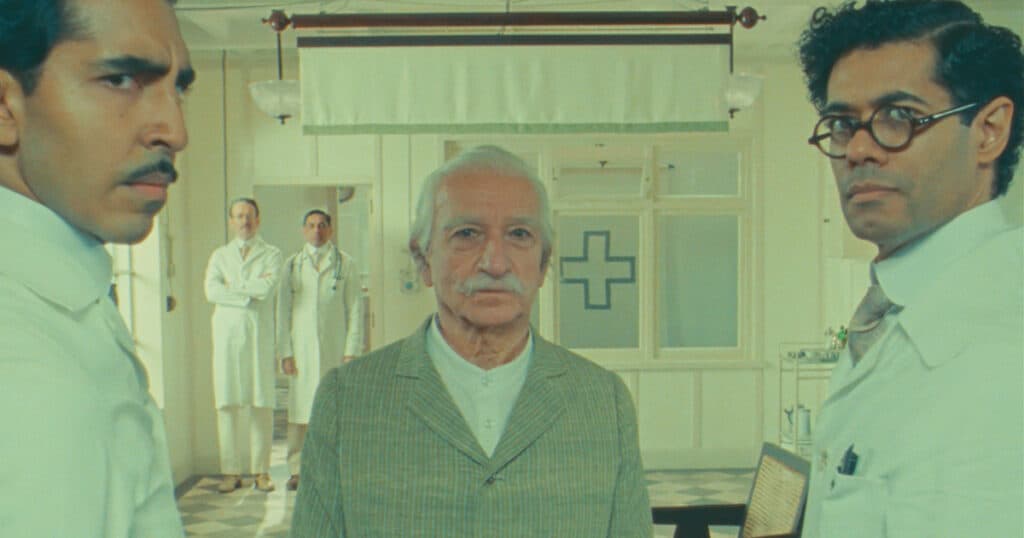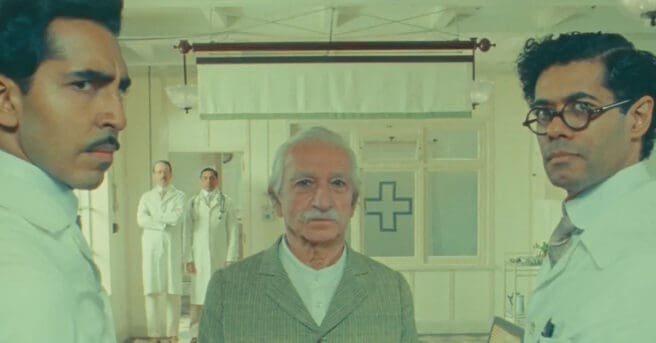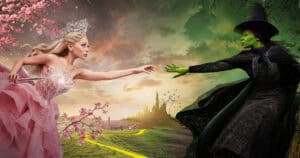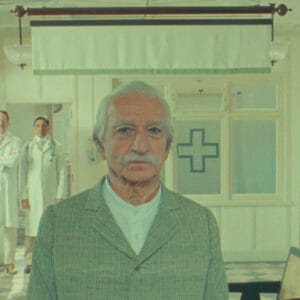Last Updated on October 3, 2023
PLOT: Wes Anderson directs an all-star collection of short films based on the work of Roald Dahl.
REVIEW: What exactly is Wes Anderson’s The Wonderful Story of Henry Sugar? When the famed director was first linked with this Netflix adaptation, everyone assumed he would be making a feature, but that’s not what this is. It’s one of four short Roald Dahl shorts Anderson has dropped on Netflix, which, taken together, roughly add up to perhaps a 70-minute (or so) anthology film.
It’s a fun experiment for Anderson and, surprisingly, perhaps his most successful work since The Grand Budapest Hotel. The centrepiece of this loose quadrilogy of shorts is The Wonderful Story of Henry Sugar itself, which runs about forty minutes and teams the director with Ben Kingsley, Benedict Cumberbatch, Richard Ayode and Dev Patel for the first time (all of whom play dual roles).
Like a lot of Anderson’s films, the movie is framed as a story within a story, with Ralph Fiennes playing a dry version of Dahl himself, who narrates the story of Henry Sugar (Cumberbatch), an aloof bachelor who discovers a story about two Indian physicians (Dev Patel & Richard Ayoade), who investigate a man (Ben Kingsley) who says he can see without his eyes.
Structurally, the film is similar to Asteroid City, with some of the story being shot cinematically, like a feature. By contrast, a lengthy tale about Kingsley’s Imdad Khan encountering a yogi from whom he learns his skill is shot like a stage play, with stage hands bringing in props.
In true Anderson fashion, the film is cast to perfection, with Cumberbatch, Patel and Kingsley dominating and delivering pages and pages of dialogue in monologue/narration. Amazingly, Anderson never worked with them before, as they fit perfectly into Anderson’s world. Despite the scant running time, Anderson’s themes come through powerfully, with the titular Sugar wanting to learn Khan’s seeing technique to cheat at cards. Initially a scoundrel, as usual in Anderson’s work, Sugar does indeed become a better man, but, it comes at a high cost.
By comparison, the other films, which are available to stream separately on the service, are smaller in scale, but they’re all interesting in their own way. First up is The Swan, which features Rupert Friend, fresh from stealing scenes in Asteroid City. He plays the narrator, who tells the story of young Peter Watson (Asa Jennings), who is tormented by two idiotic bullies. Here’s what makes the tale really interesting: you never see the bullies. In fact, there is no dialogue spoken at all, only narration, with Friend voicing everyone’s roles as Jennings reacts. Sound confusing? Well, you need to see it for yourself. It’s very strange but very cool, and Friend gets to deliver a tour de force performance.

The Rat Catcher centers around Ralph Fiennes, not playing Dahl this time, but rather the gross titular character, who tells two local fellows (a returning Ayode – who narrates – and Friend) about how he plays to catch his prey. The twist here? You never see the rats. Fiennes pantomimes their presence until, later, they’re revealed in stop-motion form.
And finally there’s Poison, in which Benedict Cumberbatch plays a man with a deadly snake sitting on him, ready to bite him, as Patel and Kingsley try to save him. All four stories are beautifully done adaptations, with them at once reverent to Dahl’s work but also winking at the author’s irascibility, punctuated by moments of Fiennes, as the author, reading his stories in his cluttered office.
Between this collection and The Fantastic Mr. Fox, Anderson has brought the author’s stories to life magnificently. The Henry Sugar collection was all shot with a tiny cast of only a half-dozen actors, most new to Anderson’s films and minimalistic sets. Unlike most of his work, these films don’t have musical scores (or any music at all), and the minimalism is a nice contrast to the more lavish Asteroid City, which got carried away (a bit) in its technique. The Dahl films are altogether different. While they can’t be classified as full-on films or even a limited series, they are lovely little pieces of Anderson’s imagination and likely movies I’ll be returning to regularly.
All four short films are now streaming on Netflix.





















Follow the JOBLO MOVIE NETWORK
Follow us on YOUTUBE
Follow ARROW IN THE HEAD
Follow AITH on YOUTUBE